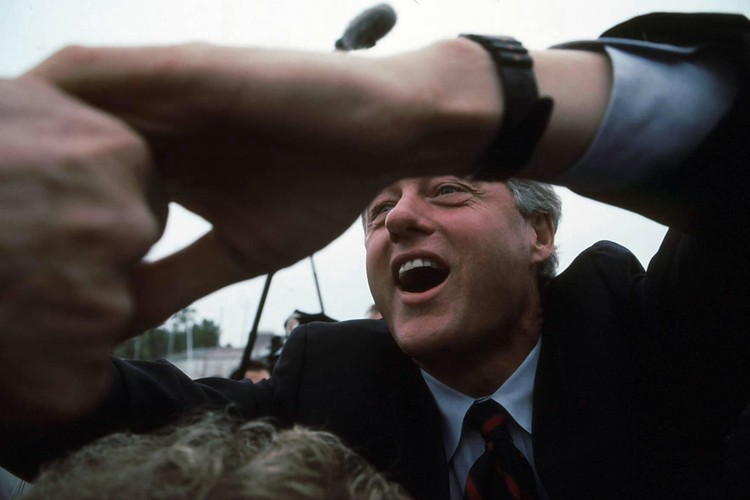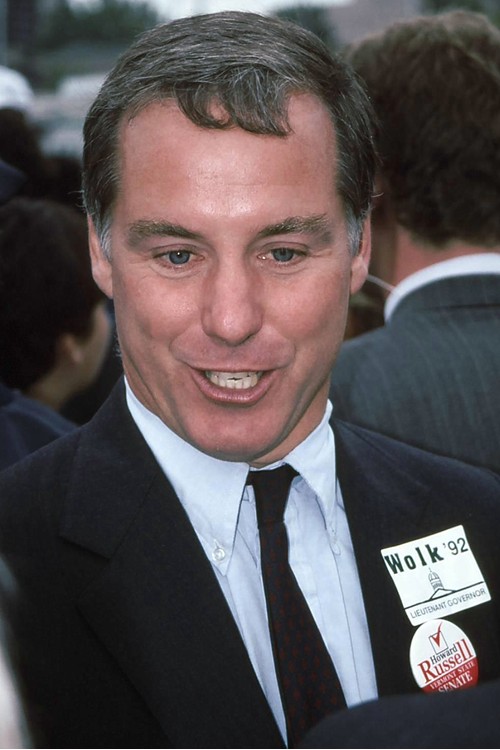Once again in Reagan National Airport, our hero pauses to reflect on the great pile of snow that landed on the city three days earlier. I have to say, it really is pretty:

Another view, around back:

We even got delayed for 15 minutes by a motorcade: not the President's, the Vice-President's. Still, I feel like I've had the full D.C. experience.
Forty minutes until boarding...then I get to pass through O'Hare for the third time in five days.
What is it with U.K. rail? One would think the wrong type of snow would no longer stop an entire train line, but the snow struck again:
IT'S NOT the snow that shut down Eurostar. It's the type of snow. "Fluffy" snowflakes got through special screens and into the power cars of five trains on Friday, shorting out the engines and stranding thousands of travellers in the Channel Tunnel for hours. Service remains cut by a third, and normal service will not resume before Christmas. Some 100,000 people have had their travel plans fouled up, by the Times' count.
... Nicolas Sarkozy, the French president, has ordered Eurostar to get its trains running again.
Airlines are charging up to £499 to fly between London and Paris until Eurostar gets things sorted.
My question: how exactly did it snow in the Chunnel?
Laredo (pop. 250,000) will shortly have no bookstores, making it the largest city in the U.S. without one:
The Associated Press reports that letters from schoolchildren had no effect on the corporation's decision to shutter the B. Dalton; Barnes & Noble announced plans earlier this year to close all remaining B. Dalton outlets. "Corporate America considers Laredo kind of the backwater," said Jerry Thompson, an author who lives in Laredo and is a professor at Texas A&M International University.
Barnes & Noble, however, says it does think that Laredo can support a bookstore. It has its eyes on a site for a "large format" Barnes & Noble -- but that won't be ready until 2011.
With no independent bookstores in the city and the last chain outlet slated for closure, residents will have to travel about 150 miles across arid ranchland to San Antonio to buy books.
Unless they have an Internet connection, that is.
Still. I think some inferences about Laredo are warranted from this fact.
Krugman has a good summary:
[T]he belief that lower wages would raise overall employment rests on a fallacy of composition. In reality, reducing wages would at best do nothing for employment; more likely it would actually be contractionary.
Here’s how the fallacy works: if some subset of the work force accepts lower wages, it can gain jobs. If workers in the widget industry take a pay cut, this will lead to lower prices of widgets relative to other things, so people will buy more widgets, hence more employment.
But if everyone takes a pay cut, that logic no longer applies. The only way a general cut in wages can increase employment is if it leads people to buy more across the board.
Really, employment won't rise until after the fundamentals get better, and general wages have very little to do with it.
Specific wage decreases do have specific effects; however, smart employers avoid offering significantly lower wages to higher-skilled workers because they don't want those workers to leave as soon as conditions improve.
Traffic author Tom Vanderbilt writes this week about the history and future of the American Drive-Thru:
But despite the Stakhanovite quotas being met by the Bluetoothed cadres across the land, all is not well with the drive-through. The facilities saw a 4 percent drop in business in 2008 due to the recession. And—more threatening still—a number of communities have recently passed anti-idling ordinances, some of which implicate even the fastest drive-through windows. ...
Meanwhile, people who would actually contribute no emissions at a drive-through window—pedestrians, cyclists, and the like—haven't exactly been having it their way. Any number of carless individuals have broached the drive-through fortress, only to be rebuffed with vague rejoinders about "company policy" (though there are some exceptions).
But not everyone is taking drive-through restrictions lying down. One Portlander—a cycling mom denied service at Burgerville—went viral, forcing a public change of heart from the company. And cyclists aren't the only ones clamoring for access: A Minnesota woman suffering from degenerative arthritis, driving a Pride Mobility Celebrity X scooter, was refused service at a White Castle, whose policy is to serve only licensed motor vehicles. ...
Sojourning as I am for a fortnight in an area with a walking score about half that of home, I still can't quite bring myself to use drive-thrus. Maybe with more socialization...
One of Chicago's largest real-estate companies has defaulted on $1.72 bn in loans:
The portfolio, which also includes 161 N. Clark St., 30 N. LaSalle St. and 1 N. Franklin St., already illustrates several recent real estate trends, such as rapidly falling property values after prices peaked thanks to large amounts of cheap debt. With credit now virtually gone, defaults on downtown buildings are likely to rise, forcing them into foreclosure or onto the market at big discounts that will put more downward pressure on prices in a spiral similar to the struggles of residential real estate across the country.
"Virtually all the assets bought between '05 and '07 cannot be refinanced today without a significant capital infusion," says Shawn Mobley, executive vice-president at real estate firm Grubb & Ellis Co. "These buildings need to be recapitalized to get back in the business of being active real estate."
Without a financial restructuring, the properties are likely to join a new trend — "zombie buildings," which can't compete for new tenants because they lack the money to cover brokers' commissions and interior office reconstruction.
My friend Gina has some things to say about using economics to figure out one's personal life, with heavy emphasis on seeing decreasing marginal utility as a leading indicator. More on that later. Right now, though, Chicago commercial real estate has some serious problems, but still not nearly as threatening as New York or Orange County, California. Right now.
Or, why anyone who cares about America—left or right—should be concerned:
[The argument] really isn't about Palin. Or about [Levi] Johnston.
It's about our democracy's apparent lack of interest any more in what is true and what is false. It's about the mainstream media's willful decision not to tackle a story that was integral to a major candidate's core integrity; it's about the Republican party elite's cynicism and condescension to millions of voters; it's about the decision of Harper Collins, Adam Bellow and Jonathan Burnham to publish a book so riddled with untruth without even a gesture toward ensuring its accuracy; and it's about the recklessness of John McCain, a man hollowed out by careerism and cynicism, selling out every scruple or principle he may have had to make his way in the modern GOP; and it's about the power of fundamentalist religion to blind everyone to the banal but vital details of secular politics.
It's about the constant struggle of being human: take the quick-and-easy route to ruin, or the slow-and-hard route to the future. Aaron Sorkin said it better:
America isn't easy. America is advanced citizenship. You gotta want it bad, 'cause it's gonna put up a fight. It's gonna say, you want free speech? Let's see you acknowledge a man whose words make your blood boil, who's standing center stage and advocating at the top of his lungs that which you would spend a lifetime opposing at the top of yours. You want to claim this land as the land of the free? Then the symbol of your country can't just be a flag; the symbol also has to be one of its citizens exercising his right to burn that flag in protest. Show me that, defend that, celebrate that in your classrooms. Then, you can stand up and sing about the "land of the free."
It's so much easier to call people names and make up stories, to make lying and cynicism the planks in a party platform. To the people leading the Republican party to its own ruin, and taking American democracy with it, I recommend meditating on Matthew 26:52.
Coincidentally with the Illinois Dept. of Resources' desperate (and probably too-late) effort to stop Asian carp from getting into the Great Lakes comes another tragically predictable outcome of local politics. The Mayor of Chicago this week forced a budget through the City Council over an unusually-high 12 dissenting votes that raids the paltry parking meter trust fund only a year after the (allegedly) corrupt and (actually) stupid decision exactly a year ago to sell the streets of Chicago:
As has become customary, aldermen bitched and moaned about Mayor Daley’s $6.1 billion budget before they passed it today. Nobody claimed to like it, though 38 aldermen voted in favor of it. But that number is smaller than it has been for most of Daley's reign. In years past the mayor viewed a single nay vote as an intolerable act of defiance; these days he’s lucky no one else has the clout to wield or goodies to hand out that he does, because his governing style is wearing thinner among an ever larger group of aldermen. As in a dozen.
Still, their arguments are getting more pointed. For evidence, consider the diatribe that 38th Ward alderman Tom Allen delivered to explain why he was casting his first vote against a Daley budget since the mayor appointed him to the City Council in 1993. “I have come to the conclusion that this 2010 budget is one that I have no confidence in,” Allen said.
He offered three reasons. “First and foremost,” he said, “the parking meter spending plan here I consider to be a breach of our fiduciary duties to the taxpayers that we represent.” Allen produced materials that Daley budget aides had distributed to aldermen a year ago when they rammed the 75-year parking meter privatization deal through the council in four days. He said aldermen were promised that the administration would save enough of the proceeds that the interest on them would equal or exceed the $20 million the city was accustomed to collecting from the meters. Instead, Daley’s budget will burn through two-thirds of the replacement fund in a single year.
The pattern should be familiar to students of 20th-century history. As they grow older, leaders become more concerned with their legacies than their constituents. The trend accelerates, until, near the end of their political careers, they almost inevitably experience epic failure. In the case of fairly-elected leaders in functioning democracies, the results are merely disappointing: Clinton, Nixon, and Gray Davis come to mind. But in the case of one-party states, where the leaders have no functioning or effective opposition, the outcome often destroys the polis as it destroys the leader: Mugabe, Cheney, and recently the mayors of Baltimore and Detroit.
I don't know which hypothesis I prefer: that Daley doesn't actually believe his actions will prove beneficial to the city in the long run, so he's feathering his nest before retiring; or that Daley, after 17 years without tolerating any criticism or dissent, has gotten so deluded he really thinks these decisions are good. Of course, without an effective challenger—where's Harold Washington when we need him most?—we're stuck with Daley Sese Seku until he chooses to leave office.
During the few months I lived in Vermont, Bill Clinton got elected President. He spoke at one big rally that year, up in Burlington, and thanks to a press pass from a friend at a radio station, I got to see him in person:

I think you can see the Secret Service agent pushing me away in this shot, though Clinton himself couldn't get enough of the rope line:

Then-Vermont-governor Howard Dean was there too:

After detecting Asian carp DNA only 10 km from Lake Michigan, the Illinois Dept. of Resources last night started killing everything in the Sanitary and Ship Canal that runs through the city:
About 8,300 liters of the liquid toxin rotenone were put into a 6-mile stretch of the canal near Romeoville Wednesday night.
More than a dozen boats were to go on the canal later today to begin cleanup operations....
The toxin was put into the water because fears that the carp--which can grow to about 150 cm and 50 kg--are pushing their way north toward Lake Michigan and could devastate the Great Lakes' $7 billion commercial fishing industry. The carp can eat 40 percent of their body weight each day.
Apparently they don't taste too good, either.
Since the Canal runs backwards, thanks to an engineering trick in 1901 that stopped us poisoning our drinking water (and started us poisoning Peoria's), the carp may not make it all the way to the lake. Except for that jumping thing they do, when they launch themselves in the air the same way pigs don't, and have occasionally cleared 20 meters.